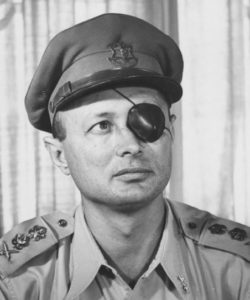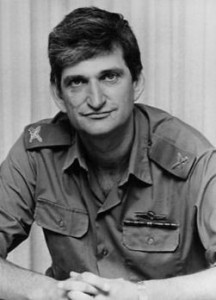Israel’s Real-Life Rambo
 Meir Har-Zion (1934-2014) was born in the new town of Herzliya in 1934. His mother’s side hailed from Sephardic-Turkish heritage, while his father’s side came from Romania and Russia. He spent his early years on a number of different kibbutzim and moshavim. He loved hiking and exploring the Holy Land, together with his younger sister, and the two youths were once arrested by Syrian authorities when they wandered a little too far. It happened again in 1951, and it took negotiations mediated by the UN to secure their release. Two years later, Har-Zion was a co-founder of Unit 101, Israel’s first special forces commando team. While sometimes brutal, the operations of Unit 101 were essential in securing Israel’s borders and maintaining its defenses in the early years. They also made it clear that the new IDF is a force to be reckoned with, and that Israel would respond forcefully if provoked. In 1954, Har-Zion joined the 890th Paratroopers, led by Ariel Sharon. The following year, Har-Zion’s beloved sister and her boyfriend were abducted by Bedouin Arabs, tortured, and murdered. Despite being ordered to restrain himself, Har-Zion vowed revenge. He took three fellow soldiers and infiltrated the Bedouin town, capturing six men, killing five of them, and sending the sixth back to relay what happened. Har-Zion was heavily condemned for his actions, and temporarily imprisoned. Still, David Ben-Gurion described the act as “the kind of ritual revenge the Bedouins understood perfectly.” In one 1956 paratrooper mission, Har-Zion was nearly killed by being shot in the throat and arm. He survived, though forced to retire due to his injuries. He was awarded the Medal of Courage. During the Six-Day War, Har-Zion was called up again and, despite having just one arm, participated in the liberation of Jerusalem. He played a key role, hunting down a Jordanian sniper that was holding up the Israeli advance, and killing him with a grenade. In the Yom Kippur War, Har-Zion volunteered again to battle for the country’s survival, and fought deep in Syrian territory, even managing to save the lives of several soldiers. Har-Zion lived out the rest of his life on a farm that he named after his sister. He married, had four children, and wrote memoirs and political commentary. Moshe Dayan described Har-Zion as “the best soldier ever to emerge in the IDF”.
Meir Har-Zion (1934-2014) was born in the new town of Herzliya in 1934. His mother’s side hailed from Sephardic-Turkish heritage, while his father’s side came from Romania and Russia. He spent his early years on a number of different kibbutzim and moshavim. He loved hiking and exploring the Holy Land, together with his younger sister, and the two youths were once arrested by Syrian authorities when they wandered a little too far. It happened again in 1951, and it took negotiations mediated by the UN to secure their release. Two years later, Har-Zion was a co-founder of Unit 101, Israel’s first special forces commando team. While sometimes brutal, the operations of Unit 101 were essential in securing Israel’s borders and maintaining its defenses in the early years. They also made it clear that the new IDF is a force to be reckoned with, and that Israel would respond forcefully if provoked. In 1954, Har-Zion joined the 890th Paratroopers, led by Ariel Sharon. The following year, Har-Zion’s beloved sister and her boyfriend were abducted by Bedouin Arabs, tortured, and murdered. Despite being ordered to restrain himself, Har-Zion vowed revenge. He took three fellow soldiers and infiltrated the Bedouin town, capturing six men, killing five of them, and sending the sixth back to relay what happened. Har-Zion was heavily condemned for his actions, and temporarily imprisoned. Still, David Ben-Gurion described the act as “the kind of ritual revenge the Bedouins understood perfectly.” In one 1956 paratrooper mission, Har-Zion was nearly killed by being shot in the throat and arm. He survived, though forced to retire due to his injuries. He was awarded the Medal of Courage. During the Six-Day War, Har-Zion was called up again and, despite having just one arm, participated in the liberation of Jerusalem. He played a key role, hunting down a Jordanian sniper that was holding up the Israeli advance, and killing him with a grenade. In the Yom Kippur War, Har-Zion volunteered again to battle for the country’s survival, and fought deep in Syrian territory, even managing to save the lives of several soldiers. Har-Zion lived out the rest of his life on a farm that he named after his sister. He married, had four children, and wrote memoirs and political commentary. Moshe Dayan described Har-Zion as “the best soldier ever to emerge in the IDF”.
Words of the Week
It is manifestly right that the Jews should have a National Home where some of them may be reunited. And where else could that be but in this land of Palestine, with which for more than 3,000 years they have been intimately and profoundly associated?
– Winston Churchill

 Moshe Dayan (1915-1981) was born on the first kibbutz,
Moshe Dayan (1915-1981) was born on the first kibbutz, 